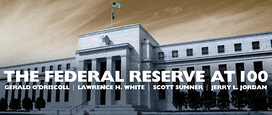The Fed: Good Compared to What?
I want to thank all those posting comments. I particularly want to thank the authors of the three other essays. I will respond to some points, and I will do so one author at a time. I have been delayed in doing so by a heavy travel schedule.
Professor White’s essay is an important addition to the discussion because he succinctly presents the historical record of Fed policy, making important comparisons to the pre-Fed record. I call everyone’s attention to his 4-point summation:
1. The Fed drastically increased inflation compared to the pre-Fed period.
2. The Fed increased price-level uncertainty.
3. The Fed has not reduced real-output uncertainty.
4. The Fed has not reduced the unemployment rate, which calls into question the whole idea of full-employment mandate.
Despite the historical record, there have been any number of papers written in the past year suggesting the Fed’s record is a good one. In light of White’s essay, I ask “compared to what?”
A Note on Bitcoin
A comment was posted on Bitcoin. This is a topic worthy of an essay unto itself, and the subject comes up in many discussions. Here is my take on it. “Money” is defined as a generally used medium of exchange. Bitcoin does not meet that definition.
I accept that Bitcoin is a work in progress, and like many others, I await further developments. But I stand by my statement that no private money has been successful if not convertible into a hard asset or assets. Warren Coats’ comment is on point here.

